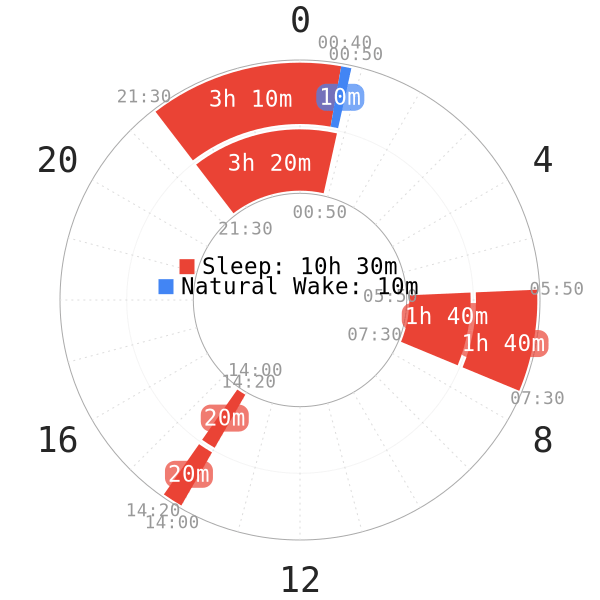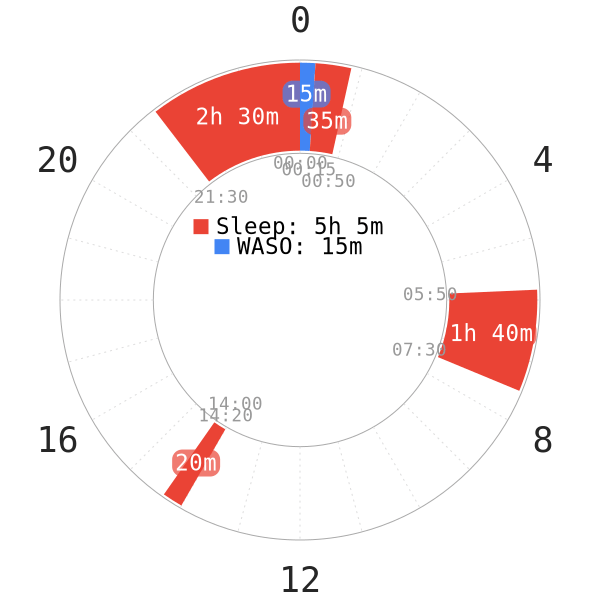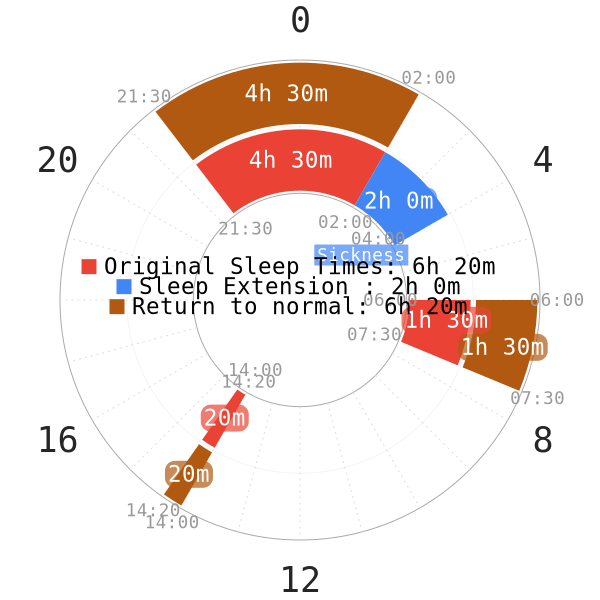Introduction
Definition Clarification
First, it is necessary to differentiate between a wake after sleep onset (WASO) and a natural wake.


- Both of these parameters refer to the instance of waking up from an ongoing sleep session.
- A WASO occurs only after sleep onset begins and can be as long as hours.
- In addition, a WASO can also be a natural wake. Sleepers can wake up on their own (e.g, nightmares) or by other surrounding noises.
- A natural wake, on the other hand, is an awakening exclusively without any alarms. This includes any external factors that cause the awakening, including noises and human alarms.
- Naturally waking up from sleep indicates that the sleeper does not return to sleep, no matter how early it is before the scheduled wake time. This is opposite to a WASO, where sleepers would actively try to continue sleeping.
Classification of Natural Wakes
Here is the list of the different types of natural wakes.
- Before alarm: This type usually happens when polyphasic sleepers wake up just mere minutes or even seconds before their alarm goes off.
- For example, they wake up at 5:50 when their Everyman 1 core ends at 6:00 AM. Thus, this would be a 10-minute natural wake.
- After adaptation, depending on your polyphasic schedule, you may consistently wake up at a specific time earlier than scheduled sleep time. For example, your E3-extended core may naturally reduce to 4h15m rather than 4h30m. Simply set your alarm as extra precautions at 4h15m mark then.
- At alarm time: Although often rare, there are natural wake instances like this. Sleepers would wake up right before the alarm goes off, just split seconds or so.
- After alarm time: These are bad natural wakes because they are oversleeps. For example, naturally waking up on one’s own 1 hour later than when alarm goes off. However, it can sometimes be advantageous.

- On “-AMAYL” polyphasic schedules, sometimes sleepers can naturally wake up after a 30-minute nap rather than 20 minutes. While it is technically an “oversleep”, these schedules’ hyper-flexibility allows occasionally longer sleep durations to compensate for the unpredictable sleep times.
- Certain polyphasic sleepers can also aim to have some flexibility in sleep duration because of emergency situations. For example, they have to sleep a bit more than usual due to some sickness or untamable tiredness. Without alarms, they can naturally wake all the time from a sleep block. If the sickness does not last more than a couple days, they can return to their previously adapted polyphasic schedules.
- Usually, a natural wake after alarm is only useful after the adaptation phase.
Natural Wakes in Different Sleep Stages
Light Sleep
- If you wake up at the same times everyday consistently, the brain will learn to insert light sleep near the end of those sleep blocks. This habit will lead to an easier and more pleasant awakening from sleep.
- Given enough time, you can even wake up entirely on your own without needing an alarm. Natural wakes from certain sleep blocks can also become more frequent after adaptation.
- Waking up in light sleep is the most ideal natural wake. This is because light sleep wakes are often very refreshing and invigorating. The transition from deeper sleep stages to lighter sleep stages and finally awakening is smooth.
Slow-wave Sleep
- Because this is the deepest sleep stage, natural wakes are extremely rare. However, more research may be necessary to answer some mechanisms of SWS when a natural wake is prepared.
- There is very little documentation and sighting on natural SWS wakes over the years in the community. However, some incidents may have happened.
- One reason why natural wakes may be possible is because sleepers may be at the weakest delta power of the SWS block. Thus, this “near the end period” of SWS and transition to other sleep stages may facilitate awakening.
REM Sleep
- REM sleep has some wonky behavior regarding awakening. According to the Sleep Inertia post, REM sleep may be moderately easy to wake from with low eye-movement density.
- Many polyphasic sleepers have incurred refreshing natural wakes from REM sleep, whether adapted or not. This is even better when they can recall vivid dreams right after waking up.
- REM sleep natural wakes are still considered suboptimal because of the following reasons:
- As adaptation progresses further, REM sleep inertia can be very disgusting to wake from, even if it is a natural wake.
- Some moderate amounts of sleep inertia are usually present after a REM wake. Additionally, many polyphasic sleepers always have trouble with REM wakes. Despite the natural wakes, they can still feel sleepy enough and fall back asleep instantly.
- The lack of transition from REM sleep to a lighter sleep stage before wake may indicate that there is ongoing interruption in a sleep cycle with REM sleep.
- To be able to see if a natural wake in REM sleep is good or not, you may perform certain cognitive tasks (e.g, Descending Subtraction Test) right after awakening.
Cautions
- Smart phone alarms should be avoided, because they do not maintain a consistent wake-time. Since they rely on very limited information from the phone sensors to track your sleep, they are not effective at this task either1–4.
- Frequent natural wakes during Stage 4 of an adaptation can lead back to Stage 3 because of sleep repartitioning deficits.
- Natural wakes have also caught many polyphasic sleepers off guard; they think they have comfortably adapted to their schedule. In fact, having natural wakes from any sleep blocks does not indicate a successful adaptation as a standalone criterion.
- Not all natural wakes are created equal. If you happen to wake up before alarm, still feel very sleepy and want to sleep in, do not close your eyes or lie in bed! This can be a deadly trap during adaptation.
Main author: GeneralNguyen
Page last updated: 30 March 2021
Reference
- Policies and procedures of accreditation for programs in nursing education. No. 14-1437. NLN Publ. January 1972:1-21. [PubMed]
- Kolla BP, Mansukhani S, Mansukhani MP. Consumer sleep tracking devices: a review of mechanisms, validity and utility. E. 2016;13(5):497-506. doi:10.1586/17434440.2016.1171708. [PubMed]
- Lee J, Finkelstein J. Consumer sleep tracking devices: a critical review. Stud Health Technol Inform. 2015;210:458-460. [PubMed]
- Lee-Tobin P, Ogeil R, Savic M, Lubman D. Rate My Sleep: Examining the Information, Function, and Basis in Empirical Evidence Within Sleep Applications for Mobile Devices. J Clin Sleep Med. 2017;13(11):1349-1354. [PubMed]
